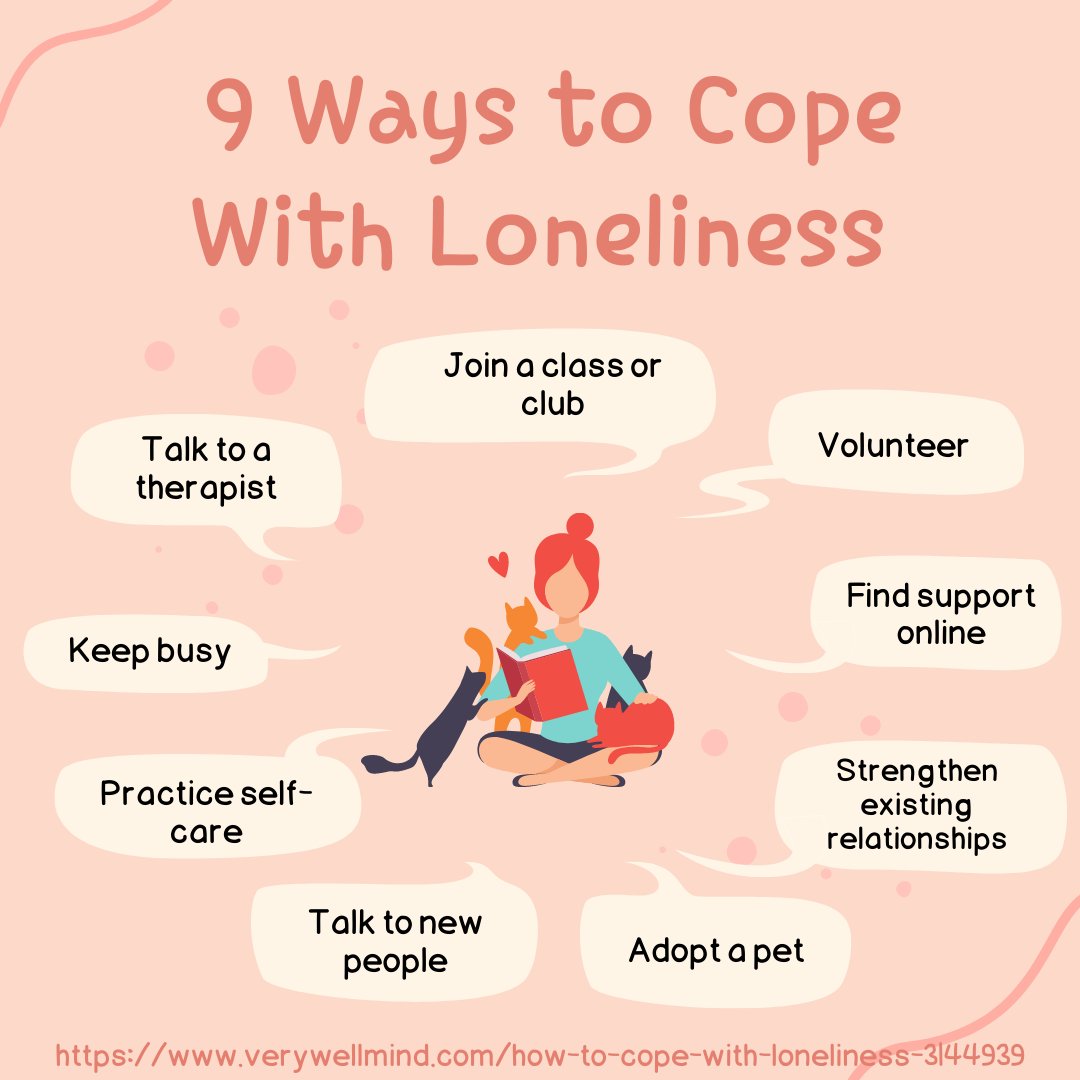Loneliness, though often overlooked, is a universal human experience. It can manifest in various forms, from feeling disconnected in a crowd to enduring prolonged periods of isolation. In today’s fast-paced and digitally connected world, loneliness has become increasingly prevalent. However, it’s essential to recognize that being alone doesn’t necessarily equate to loneliness, nor does being surrounded by people guarantee its absence. Coping with loneliness requires understanding its roots and implementing strategies to navigate its challenges effectively.

Understanding Loneliness:
Loneliness is more than just physical isolation; it’s a complex emotional state characterized by a perceived lack of meaningful connections with others. It can stem from various sources, such as social isolation, changes in life circumstances, or even internal factors like low self-esteem or depression. While it’s natural to feel lonely at times, chronic loneliness can have profound effects on mental and physical well-being, leading to increased stress, anxiety, and even a weakened immune system.
Recognizing the Signs:
Recognizing the signs of loneliness is essential for effectively coping with this complex emotion. While loneliness can manifest differently for each individual, there are common indicators to be mindful of. Understanding these signs can help individuals identify and address their feelings of loneliness before they escalate. Check this link right here now to get to know about loneliness via a video
Here are some key aspects to explore when recognizing the signs of loneliness:
Emotional Symptoms:
Loneliness often manifests as a range of emotional symptoms that can vary in intensity. These may include:
Feelings of emptiness or sadness:
Individuals experiencing loneliness may feel a deep sense of emotional emptiness or sadness, even when surrounded by others.
Persistent longing for connection:
There may be a constant yearning for meaningful relationships and a sense of belonging.
Low self-esteem:
Loneliness can be accompanied by negative self-perceptions, leading individuals to doubt their self-worth and value to others.
Anxiety and depression:
Prolonged periods of loneliness can contribute to heightened levels of anxiety and depression, affecting overall mental well-being.

Social Withdrawal:
One of the hallmark signs of loneliness is social withdrawal or avoidance of social interactions. Individuals may:
Withdraw from social activities:
They may decline invitations to social gatherings or events, preferring to spend time alone.
Isolate themselves: Loneliness can lead to self-imposed isolation, where individuals retreat from social settings and prefer solitude.
Have difficulty forming or maintaining relationships:
Loneliness can impact the ability to connect with others, leading to challenges in forming and maintaining meaningful relationships.
Physical Symptoms:
Loneliness can also manifest in physical symptoms that may impact overall health and well-being. These may include:
Fatigue and lethargy:
Feelings of loneliness can drain energy levels, leading to increased fatigue and a lack of motivation.
Insomnia or disrupted sleep patterns:
Difficulty falling asleep or staying asleep may be a common symptom of loneliness, as individuals ruminate on feelings of isolation and disconnection.
Changes in appetite:
Loneliness can affect appetite regulation, leading to changes in eating habits such as overeating or undereating.
Cognitive Patterns:
Loneliness can influence cognitive patterns and thought processes, contributing to negative thinking and rumination. Individuals experiencing loneliness may:
Engage in negative self-talk:
They may internalize feelings of inadequacy and self-doubt, leading to a cycle of negative self-talk.
Ruminate on past experiences:
Loneliness can prompt individuals to dwell on past rejections or failed relationships, exacerbating feelings of isolation.
Experience difficulty concentrating:
Cognitive functioning may be impaired, making it challenging to focus on tasks or engage in problem-solving.
Behavioral Changes:
Loneliness can also manifest in observable behavioral changes that may indicate underlying feelings of isolation. These may include:
Increased use of technology:
While technology can facilitate social connection, excessive use of social media or online forums may be a sign of compensating for feelings of loneliness.
Avoidance of social situations:
Individuals experiencing loneliness may avoid social interactions or situations that require social engagement, preferring to remain in familiar and comfortable environments.
Lack of initiative or motivation:
Feelings of loneliness can lead to apathy and a lack of motivation to engage in activities or pursue interests.
By exploring these various aspects of recognizing the signs of loneliness, individuals can develop greater self-awareness and take proactive steps to address their feelings of isolation. It’s important to remember that experiencing loneliness is a common and normal part of the human experience, and seeking support from friends, family, or mental health professionals can be instrumental in coping effectively with these feelings.

Strategies for Coping:
Cultivate Self-Awareness:
Start by acknowledging and accepting your feelings of loneliness without judgment. Understand that it’s a common human experience and not a reflection of personal failure. Reflect on the underlying causes of your loneliness, whether it’s due to life transitions, relationship dynamics, or internal struggles.
Foster Meaningful Connections:
Quality over quantity is key when it comes to relationships. Focus on nurturing genuine connections with friends, family, or like-minded individuals who share your interests and values. Engage in activities that allow for meaningful interactions, whether it’s joining a club, volunteering, or attending social events.
Embrace Solitude:
While loneliness can be distressing, learning to embrace solitude can be empowering. Use alone time as an opportunity for self-reflection, creativity, and personal growth. Practice mindfulness and engage in activities that bring you joy and fulfillment, whether it’s reading, writing, or pursuing hobbies.
Utilize Technology Mindfully:
Technology can be a double-edged sword when it comes to loneliness. While it enables us to connect with others virtually, excessive use of social media can exacerbate feelings of isolation. Use technology mindfully by setting boundaries on screen time and prioritizing face-to-face interactions whenever possible.
Seek Professional Support:
Don’t hesitate to reach out for professional help if feelings of loneliness become overwhelming or persistent. Therapists, counselors, or support groups can provide valuable guidance and support in navigating loneliness and addressing underlying issues contributing to your emotional state.
Practice Self-Care:
Take care of your physical and emotional well-being by prioritizing self-care practices. Maintain a healthy lifestyle through regular exercise, balanced nutrition, and adequate sleep. Engage in activities that promote relaxation and stress relief, such as meditation, yoga, or spending time in nature.
Cultivate Gratitude:
Shift your focus from what you lack to what you have by cultivating a mindset of gratitude. Take time each day to reflect on the things you’re grateful for, whether it’s the support of loved ones, moments of joy, or simple pleasures in life. Practicing gratitude can help counteract feelings of loneliness and enhance overall well-being.
Conclusion:
Coping with loneliness is a journey that requires self-awareness, resilience, and proactive strategies. By understanding the nature of loneliness, recognizing its signs, and implementing effective coping strategies, individuals can navigate periods of solitude with greater ease and resilience. Remember that you’re not alone in your experience, and reaching out for support is a sign of strength, not weakness. Embrace the opportunity for self-discovery and growth that loneliness presents, and remember that meaningful connections and fulfillment are within reach, even amid solitude.
Through understanding and recognition, we pave the way for healing and growth. Loneliness, though formidable in its grip, need not be an insurmountable obstacle. By embracing vulnerability, fostering meaningful connections, and cultivating self-awareness, we can forge a path toward wholeness and belonging. Together, let us embark on a journey of self-discovery and compassion, as we confront the specter of loneliness and emerge stronger, more resilient, and more connected than ever before.
